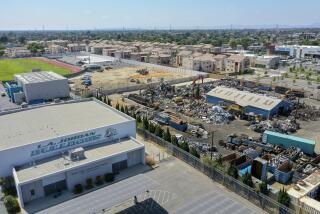Trial Ordered for Man in Fatal Blast
- Share via
SAN BERNARDINO — A civilian explosives expert who had been charged with second-degree murder was instead ordered Thursday to stand trial for involuntary manslaughter in connection with the blast of a military shell that killed a worker at a commercial scrap yard.
Timothy Collister, 56, of Victorville was ordered to return to Superior Court here for arraignment on July 22 but was released from his $70,000 bail by Judge Michael A. Smith.
Smith pared the prosecution’s request that Collister face murder charges that could have brought up to a life term in prison. Instead, Collister could receive a maximum four-year prison term--or probation and no incarceration--if convicted.
At the same time, a jury may now decide whether Collister should face criminal accountability at all for the March 18, 1997, explosion at a Fontana scrap metal yard that killed worker Martin Mendoza, 22.
Discussion of a possible plea bargain is premature, said San Bernardino County Deputy Dist. Atty. Charles Umeda, who is prosecuting the case.
Mendoza, using a blowtorch, was attempting to dismantle what he believed to be an inert military shell. Instead, the 105-millimeter antitank shell--containing the equivalent of more than 2 pounds of TNT--blew up, killing him instantly.
Collister was the on-site manager of a civilian subcontractor assigned to identify unexploded ordnance on the live-fire ranges at the Army’s sprawling Ft. Irwin training center near Barstow. The company’s employees were to flag and leave behind the live ordnance, and clear the range of harmless scrap residue for later bulk sale to commercial scavengers.
For about three years, the scrap pile on the base grew to about 1.4 million pounds before being sold in December 1996 to Dick’s Auto Wreckers, where the steel and aluminum were to be separated for sale to recyclers. The live shell, presumably fired from an M-60 tank during simulated combat maneuvers about 20 years ago, was not spotted in the scrap pile that Collister certified as safe before being trucked to the scrap dealer.
The prosecutor argued that Collister, as the head civilian in charge of the scrap salvage process at Ft. Irwin, should be held criminally responsible for allowing the shell to leave the base.
The judge agreed Thursday, but not to the degree that the prosecution sought.
A second-degree murder charge, Smith ruled, was too extreme because evidence failed to show even minimally that Collister knew of the danger lurking in the pile and deliberately--and with conscious disregard for public safety--allowed the shell to leave Ft. Irwin.
Nonetheless, the evidence showed a history of live ordnance mistakenly being shipped off military bases, Smith said, calling the screening process “flawed.”
“Certainly, Mr. Collister was in a position to know material was ultimately destined for the civilian population,” Smith said. “He was under a duty to use his very best efforts, given the limitations of what could be done, to make sure no live ordnance got through.”
Whether Collister could be convicted of involuntary manslaughter was, Smith said, a “close question” for a jury to decide.
Collister’s attorney, James Blatt, argued that Collister was the scapegoat in a tragedy that could be blamed on many others--including military brass who tolerated a flawed screening process that allowed material to leave base without each item being individually inspected.
Answered the judge, “The fact that the system in place by the Army may have been flawed . . . does not diminish the responsibility of Mr. Collister.” Whether others--in addition to Collister--should face civil or criminal charges wasn’t an issue before the court, Smith said.
Umeda said afterward that he was disappointed that he could not prosecute Collister for second-degree murder, “but we’ll still have our day in court and I’m confident we’ll get a good verdict.” Collister, Umeda said, was the only person charged in the case because he was ultimately responsible for ensuring the safety of the scrap metal.
Umeda said that before the explosion, Collister sought to have other screeners sign a certificate of safety. But the others refused to certify the scrap as safe, because some live ordnance had been found in the scrap pile at Ft. Irwin, yet nothing was done to reexamine the entire pile.
Collister, nonetheless, certified the shipment as safe.
“There were systemic problems, but it’s not sufficient to say the entire system has problems, if you have individual responsibilities,” Umeda said.
Blatt said his client--a military veteran with explosives experience who has since retired from civilian work--was “very pleased” with Thursday’s decision.
“What’s so offensive about this case,” he said, “was that the military has shifted its liability” to Collister and his Virginia-based employer, Octagon Inc.
After the Fontana explosion, military experts found 55 more explosive military pieces at the scrap yard, including some that were deemed potentially lethal.
More to Read
Sign up for Essential California
The most important California stories and recommendations in your inbox every morning.
You may occasionally receive promotional content from the Los Angeles Times.










